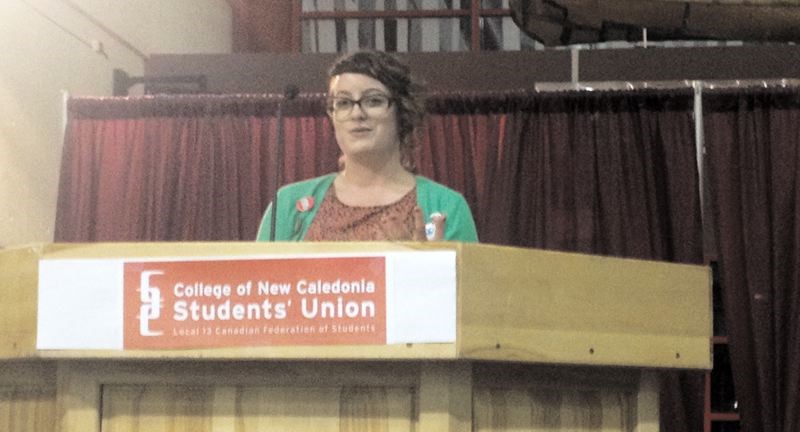Students at the College of New Caledonia held a forum Thursday criticizing provincial cuts to adult basic education that could see the college charging new fees starting May.
Speakers argued the policy, which affects graduated adults, would especially impact low-
income and aboriginal learners.
For CNC students, it will affect the College and Career Preparation program, for students who need to fulfill prerequisite courses or need better marks to access a post-secondary program.
Candace Eisert hasn't yet completed the program and said she doesn't know if she will be able to afford the cost.
"I hope they reconsider this fee structure because this is already affecting my decisions for the future," said Eisert, who used to live in Fraser Lake, a small community two hours west of Prince George.
"Growing up in a small community you don't get the same opportunities as you would in the city. We didn't always have the minimum amount of students for certain classes to be available."
Last week CNC's faculty called the proposed fee a barrier to education. On Feb. 27, the board of governors will vote whether to charge tuition for program and, if so, how much.
Eric Depenau, who is a student representative on the board, said the proposed increases could be between $320 to $560 for previously free courses.
He noted that adult basic education courses don't count towards a degree.
"You're really paying tuition for the privilege of paying further tuition," said Depenau before asking the audience of about 40 people to sign a petition, that already has about 200 signatures.
"I want to make it clear that I don't feel that these are the college's decisions that they're making right now. It's largely being forced into this position by provincial and federal governments."
But Keith Tedford said even before the September 2008 provincial policy granted graduated adults free upgrades, the college didn't charge its students for those courses.
"The (program) has been tuition-free for much longer than that. As far as I can tell - and I've asked around - CNC stopped charging tuition for upgrading at some point in the '90s and we're darn proud of it."
Tedford, who teaches English for the program, said he was furious when he heard of the cuts.
"What should we do?" asked Tedford. "We have to stand up. We have to contact our MLA's and we have to tell them that we oppose these cuts so they can take that message to Victoria for us."
Trudy Mothus, who teaches for School District 57 in the area of distance education, noted the types of students who access course upgrades from the district are very different from those who go to the college.
Many of the students are single women with children.
"They struggle to feed the children and themselves. For them, they come to us because having to pay for a parking pass at CNC is beyond them," Mothus said.
"I am here for my colleagues to advocate for the people that we work with in School District 57, the ones who will be screwed," said Mothus, who has been teaching for 45 years and with distance education for the past 10.
By Mothus and her colleagues' count, the true effect of the cuts and use of the courses at the school district level, aren't being tracked.
"We came up with between December 2014 and today we actually have 350 (graduates), just rounding off, in our adult programs in the school district," she said.
But what's being reported to the ministry, she said, is something different.
"They say we have only 33 in our (distance education) head count and only 43 in the continuing education," she said.
"So there's something wrong in the figures that I have to do a little more digging into."
In December, school district superintendent Brian Pepper said of the 140 enrolled students in continuing and distance education this year, 10 to 15 were graduated students. Last year 30 out of 220 students had their high school diploma.



